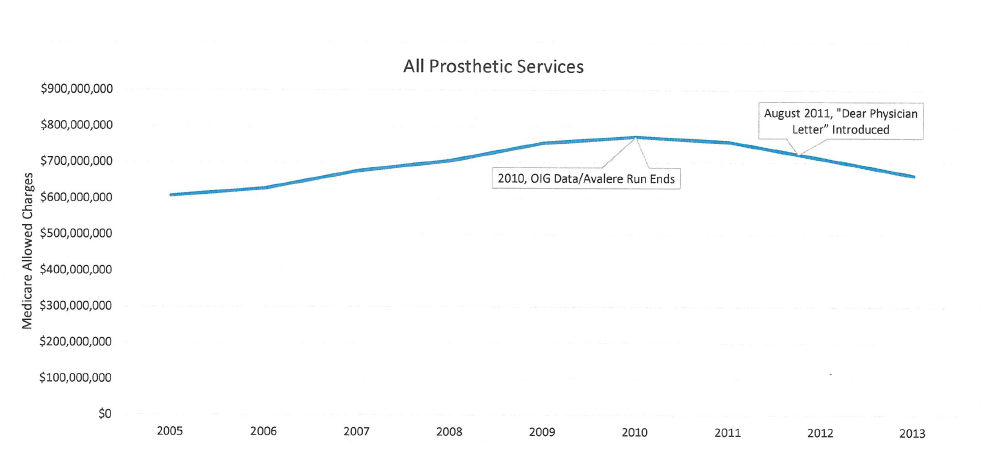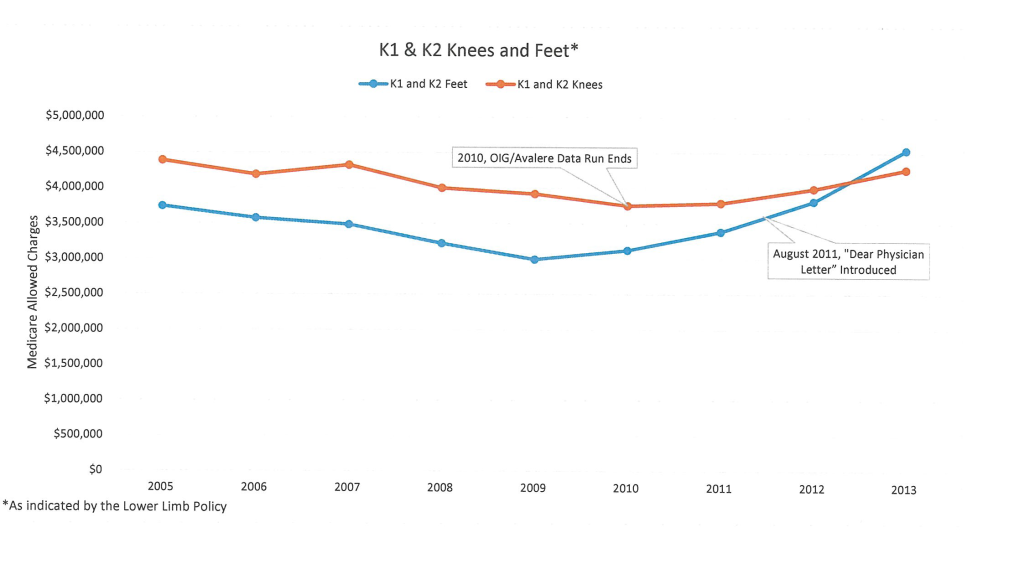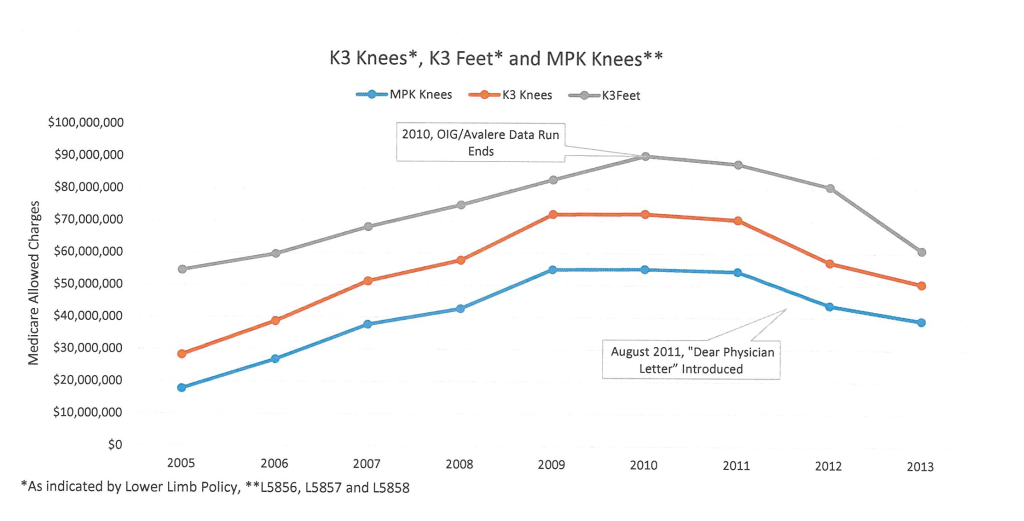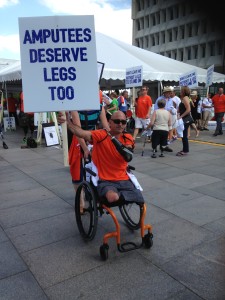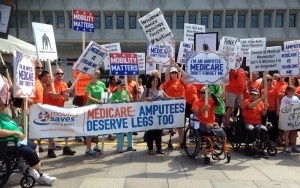August 11, 2015
The Honorable Sylvia Mathews Burwell
Secretary, U.S. Department of Health & Human Services
200 Independence Avenue, S.W. Washington, D.C. 20201
Re: Concerns with Medicare’s Local Coverage Determination (LCD) for Lower Limb Prostheses (DL33787)
Dear Secretary Mathews Burwell:
I am writing about my concerns with Medicare’s Proposed/Draft Local Coverage Determination (LCD) for Lower Limb Prostheses (DL33787) issued on July 12, 2015 by Medicare’s DME Medicare Administrative Contractors (DME MACs).
I am an amputee; more specifically I am a right below-the-knee amputee and have been dependent on the skills, dedication and artistry of prosthetists since entering the amputee world as a consequence of an injury in Vietnam in 1969. I have also been a beneficiary of the tremendous advances made by relatively small businesses (i.e., prosthetic clinics) that often use the research and development of the Federal government to make steady improvement in the functionality and comfort of my prosthetic limb.
To the non-amputee community, I hope you know that no one makes better legs than the ones we are given at birth. No matter how skilled our professionals, no matter how support groups help us ski, run and perform athletically, no matter how far we go with technology, the leg I was born with will always be better than the prosthetic one I fasten to my body every morning.
In my opinion the worst thing you can say to a new amputee is: “You’ll be as good as you were before†or “You’ll be able to do everything you did before.â€Â Sadly, that just isn’t true. Thanks to great prosthetists and advances in technology, it is true that I have been able to do most everything I used to do before losing my leg and have lived an active, productive, love-filled life. However, I will never feel the joy of wiggling my toes in the sand or grass and never participate in the quick, exhilarating transition from life on land to life in the water.
The moment I became an amputee I became a different man and not just because of my limitations. I am more compassionate in my good moments, more capable of understanding the suffering of others, more grateful and thrilled when I allow myself to be loved and love in return. Becoming an amputee was not my favorite gift in life but it was a gift all the same.
For more than half of my life I have experienced the ups and downs of wearing an inanimate object. Some days are great. Some aren’t. Some days I experience very little pain. Some days I experience nothing but pain. When I gain or lose a little weight my left leg adjusts without difficulty. My prosthetic does not. When I cut my left leg, a small amount of first aid will allow me to heal. Rarely do I see a professional for such things and it never slows down life.
My right leg, the one where I wear a prosthesis, is a different matter. When the skin is damaged on my residual limb, inflammation and swelling is part of the healing process. And that little bit of change in the shape of my stump can require significant adjustments. It can make walking impossible. Here’s why: I treat a cut to my left leg in an aerobic environment; my right leg has to heal in an anaerobic environment.Bacteria hate the former and love the latter.
One more piece of background before I make an argument against Medicare’s Draft LCD and suggest as strongly and respectfully as I can that this proposal be withdrawn in favor of an alternative approach to reducing any perceived overutilization or even fraud.   If this LCD goes into effect, Medicare officials will be responsible for increasing the suffering of hundreds of thousands of men and women who are working hard to make their way in the world as amputees.
I need you to know that when it comes to paying for my prosthesis, I am a very lucky man. No doubt my ambitions also make me a very demanding man. Sometimes I am shocked that my prosthetists have remained my friends.
I am lucky because under federal law I have a claim on the incomes of all Americans to pick up the tab for my prosthesis. The law says that all I have to do is prove that I was injured in a war and every tax-paying American (including me by the way) chips in a few pennies to cover the cost of fabricating, fitting and maintaining my limbs. My own view is that federal law should lower the bar a little and require men, women and children who have suffered an amputation to prove they are an American citizen or here legally to enjoy the same benefit.
I am also a lucky man because I became an amputee when I was 25 years old.  It is so much easier to deal with any injury to our body when we are young. We heal faster, we are stronger, and we believe we can do anything. We haven’t become as grumpy, and we probably have much more support since most of us have loving parents, family and friends to provide essential emotional support.
In truth, I don’t have many complaints and those I have I keep to myself. Pain is my problem not yours. If this misguided LCD goes into effect, it will be little more than a minor inconvenience not worthy of an entry into my diary. All it will do is make me angry that well-meaning men and women who work for our government have one more time made life more rather than less difficult for its citizens.
So, finally, here is my list of specific concerns about Medicare’s Proposed/Draft LCD:
-  Prosthetics should not be in the same category as durable medical equipment (DME) because the provision of prosthetic care is fundamentally different from the delivery of DME commodities. Ironically, I do expect that the likely result of this LCD will be more amputees being relegated to durable medical equipment, including wheelchairs, in order to be mobile. And for the record, using devices that assist in walking such as a cane, crutches or a walker is common and advisable for many seniors and people with disabilities whether or not they use prosthetics. Medicare’s Draft LCD seems to say that “If you use a cane or anything that reduces the chances of a fall, we won’t pay for your prosthetic limb.â€
- Learning to walk with a prosthetic limb is a bitch. The Draft LCD states the patient has to be “motivated to be ambulatory.â€Â  The LCD makes it sound as simple as getting an adolescent to do their homework. Trust me, it is a hell of a lot more difficult than that. (Haven’t you ever had a morning when you didn’t want to get out of bed?) It’s not like putting on a new shoe. Medicare’s Draft LCD places the burden on the prosthetist to bear the cost of this decision. I do not need to be a professional psychologist to predict the outcome: fewer amputees will be encouraged to push through the early pain and suffering. One more personal note: It was a surgical revision nine years after my original amputation that enabled me to have regular, relatively pain free days. Medical complications from the amputation itself can have a profound impact on a person’s “motivation†to ambulate and beneficiaries should not be denied prosthetic care because of such complications.
- In a remarkable example of language only our government would use, the Draft LCD states: “If there is no qualifying amputation, claims will be denied as not reasonable and necessary.â€Â Once you go down a rabbit hole where all rules become those of the Red Queen that leads you to this companion rule: “If any part of a prosthesis is denied as not reasonable and necessary, all-related additions will be considered unnecessary.â€Â With these two federal mandates, an amputee who depends on Medicare will find precious few prosthetists who will be willing to help them.
- A young amputee whose commercial insurance has been paying for prosthetics will not automatically qualify for Medicare. But all payers, including the Veterans Administration, will eventually follow Medicare’s LCD on lower limb prostheses. This proposed policy is just wrong and will encourage private insurers to be even more restrictive than they already are in the provision of prosthetic care.
- The Draft LCD states that a “test socket†is not reasonable and necessary for many prostheses and will not be reimbursed. Come on! A test socket is a clear, diagnostic prosthetic socket that assists the prosthetist in designing a properly fitting prosthesis with minimum problems. Restrictions in coverage of test sockets will lead to additional costs to the Medicare program in the long term as poorly fitting prostheses will have to be adjusted or even replaced.
- Repairs and adjustments will not be covered in certain instances. To borrow one of Donald Trump’s favorite phrases: This is just stupid. The LCD should do just the opposite. By paying for repairs and adjustments, CMS will increase the chance that the amputee will be able to walk comfortably and enjoy an active life.
- Socket and other component replacements will not be covered in certain circumstances. This policy also makes no sense and will lead to increased costs and more significant disability.
- The LCD states that feet and ankles that utilize a microprocessor are not reasonable and necessary for many amputees, despite the fact that this technology has become the current standard of care. Please, do not do this! If CMS does proceed with this policy, it should send the same message to our pharmaceutical companies, our surgeons, and our oncologists: Our government will not pay for any technology that CMS decides is too expensive. It is not an exaggeration to say that research into advanced prosthetics will not only cease but the standard of care will regress back to the good old days in 1969 when I was first fit with a wooden leg.
- The Draft LCD requires an independent functional evaluation in order for the patient to qualify for various types of knee, foot, and ankle technology. I presume this proposal derives from the government’s concern that some providers or suppliers are engaging in overbilling or even fraudulent activities. There is an easier way of solving this problem: Just shut down any provider or supplier who bills Medicare for services and devices they do not provide or which are obviously not needed. Why make all patients suffer more administrative challenges and less access to appropriate prosthetic care when the bad actors can and should be simply removed from the program.
So, what do I think you should do with this Draft LCD? My sincere recommendation is to throw the entire thing out: rescind this Draft LCD and begin a discussion with stakeholder groups to resolve any concerns that CMS may have with the prosthetic benefit. This really is a case of the government creating a problem rather than solving it.
The Draft LCD is so restrictive that one wonders if it is being motivated by increased Medicare spending for prosthetic limbs. But Medicare data do not support this rationale. Below is a chart that shows that, adjusted for inflation, the cost for prosthetics (and the test sockets the LCD seeks to restrict) is not materially different than it was in 2005.
Year  All Prosthetics Test Sockets
2005Â Â $607,797,189Â Â $19,136,194
2006Â Â $628,220,869Â Â $19,601,015
2007Â Â $676,421,628Â Â $20,733,807
2008Â Â $704,604,327Â Â $21,316,437
2009Â Â $753,410,033Â Â $22,666,832
2010Â Â $770,462,739Â Â $22,968,807
2011Â Â $756,256,554Â Â $22,310,129
2012Â Â $710,599,453Â Â $20,672,902
2013Â Â $664,405,441Â Â $19,627,394
Total prosthetic limb spending for Medicare peaked in 2010 and has decreased every year since. These numbers actually make the case that we should consider adding prosthetic reimbursement to Medicare so that each American – regardless of age – will have the cost of their prosthetic limb shared by all of us, just as we do for Americans with non- functioning kidneys. Total spending on prosthetic limbs and orthotic braces by all payers in this country is less than $2 billion a year. To put that amount in perspective we spend $7 billion a year for hip and knee replacements.
Just as we do with Americans who need renal dialysis, we should not make amputees prove they are poor and promise to stay poor in order to be eligible for Medicaid. We should not make them hope to work for the right employer in order to get income tax subsidies.  We should not make them get blown up in a war. We should change the law so that all they have to prove is that they are an American citizen and that they are missing a limb and would like a prosthesis; that should be enough.
Many will argue that charitable organizations can fill this need. I understand and am completely sympathetic with this point of view.  I have been a beneficiary of and witness to the inspiring willingness of the people of our country to give their time, their income and their wealth to complete strangers who are in need. But all evidence will show that charity alone will not solve this problem. The facts will demonstrate that if prosthetic limb coverage and reimbursement is added as a benefit of Medicare for all Americans, there will still be a great need for charity.
As to the question of overutilization or fraud which I assume is the motivation for this rule: Why not just permanently kick any provider or supplier who bills for things not delivered or things obviously not needed or who takes advantage of the frail elderly out of the program? Extensive audits and counterproductive rules are not needed to eliminate overbilling and fraud for lower limb prosthetics. Just ask any good professional (and most of them are) and they will tell you where you can find the bad apples.
I do know that Medicare officials have a tough job. We all want to eliminate waste, fraud and abuse in government spending and tend falsely to blame the “bureaucrats†for messing everything up. I do not. I am grateful for your conscious efforts and hope my letter will help you make your final decision.
Respectfully yours,
Bob Kerrey |
